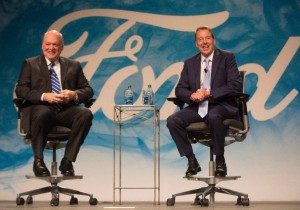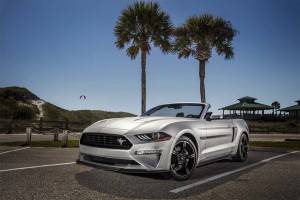
Ford CEO Jim Hackett and Chairman Bill Ford told shareholders that they are in favor of leaving CAFE standards where they are.
Ford Motor Co. top officers fended off challenges from environmentalists and stockholders during the company’s annual meeting, but shareholder dissatisfaction was clear once the votes were counted.
Executive Chairman William Clay Ford Jr. said there was a lot of “misunderstanding” about the company’s position on corporate average fuel economy, which the Trump administration has proposed rolling back.
“We are not asking for a rollback. We want California at the table. We are working for one national standard that includes California,” the chairman insisted in response to a question during the “online” meeting by shareholder, who asked about the company’s lobbying efforts.
Ford Motor came under criticism from environmental groups, such as Public Citizen, Greenpeace and the Sierra Club for saying one thing publicly while lobbying the Trump administration to alter the existing fuel economy standards set during the Obama administration, which were determined after extensive consultation with the State of California.
(Ford supports keeping CAFE, wants national standard. Click Here for the story.)

Public Citizen and others have protested Ford's willingness to allow CAFE standards to be rolled back. Ford has reversed the position.
The Trump administration has indicated it is ready to challenge California’s right to veto clean air standards — and by extension fuel economy rules. The administration’s efforts have boxed in automakers such as Ford, which has been openly critical of the Obama-era standards but don’t want to see their reputation damaged in the critical California market.
Ford also said the company intends to remain a leader in what has become a rapidly changing transportation sector and is committed to bringing a new generation of electric vehicles to the market, starting in 2020.
Jim Hackett, who became CEO last May, said Ford is marshalling it resources to provide the capital necessary for the transition to a future with electric vehicles and autonomous vehicles. “We believe freedom of mobility drives human progress,” he said.
(Click Here for more about Ford halting F-150 production due to a supplier fire.)
In addition to the $14 billion in cost savings it outlined last year, it also expects to trim another $11 billion in costs by eliminating unprofitable vehicles from its model line and adding new vehicles to its portfolio. The company’s progress in its cost-cutting efforts means it will reach its targets in 2020, two years earlier than originally planned.
Ford, however, did not make any announcement, as some had speculated, about a major new redevelopment effort in Detroit centered around the old Michigan Central train station, one of the city’s most famous “ruins.”

Ford remains committed to its move away from cars, except the Mustang, executives reiterated to shareholders.
Despite the assurances from the company’s top officers, signs of shareholder discontent with the company’s sagging stock price and other issues were evident when the votes were tallied on the various proposals considered at the meeting. More than 10% of the shareholders – a relatively high number – voted against the company’s preferred slate of directors. Also, nearly one third of the company’s shareholders, 31%, voted against changes to the company executive compensation plan.
(To see more about Ford’s new tech that allows the blind to “feel the view,” Click Here.)
In addition, more than a third of the shareholders voted for a proposal that would have changed the special voting rights granted the Ford family’s bloc of stock. Proposals from dissident shareholders seeking greater disclosure of the company’s lobbying expenses and greenhouse gas emissions also picked up support from more an 12% of the company’s shareholders.

If Ford is not lobbying for backing down the CAFE standards requirements, why are they getting rid of its car fleet sans Mustang and Focus? Their core truck buyers aren’t looking for an electric truck.
Ford’s concentration is on trucks / C- and SUVs. W/O some kind of car fleet it will be difficult to make CAFE numbers, unless they are lobbying for truck credits.
Apparently trucks come under a different set of rules. See the Wall Street Journal article about Ford.